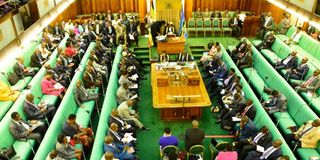It’s Parliament’s mandate to question oil payout

Parliament during plenary
What you need to know:
- Much as the roles of these officers should be applauded, it should be noted that an external law firm was hired to handle the arbitration at a cost of more than Shs88 billion.
- It is erroneous to state that Parliament should not question payouts from the Consolidated Fund, because this is their mandate.
Parliament’s attention has been drawn to a letter in Daily Monitor, titled, ‘Should Parliament question Shs6bn oil cash bonanza?’ in Daily Monitor of January 12.
The letter, to an extent reveals that the writer has limited knowledge of the of the roles of Parliament and the circumstances surrounding the provisions of the Income Tax (Amendment Bill), 2016, which was recently assented to by the President.
Contrary to what the letter states, Parliament is not blaming the President for approving the handshake. What Parliament is seeking to do is perform one of its core roles of oversight. The House is responsible for the appropriation function which is the budget process. After the allocation of these resources to the different sectors, it is the same MPs who are to perform the oversight on how these resources have been utilised.
It is against this background that the MPs were seeking to find out the circumstances under which the rewards were paid, the names of the public officers involved, the role played by each officer, the amounts paid so far in taxes by Heritage & Tullow oil companies in respect of arbitration proceedings and the fund on which these funds are kept.
The MPs also noted that the payment of the award amounts to abuse of public funds since the officers were carrying out their normal duties in their course of employment and yet the payment was irregular since it was not appropriated by Parliament under the Public Finance Management Act, 2015, as the law stipulates.
Much as the roles of these officers should be applauded, it should be noted that an external law firm was hired to handle the arbitration at a cost of more than Shs88 billion. It is on this basis that Parliament felt it needed to carry out an investigation into the circumstances surrounding the pay out of the said amounts to the 42 public officers.
It has also been grossly misrepresented that MPs exempted themselves from paying taxes following the passing of the Income Tax (Amendment) Bill, 2016. The Act only exempts legislators from paying taxes on Mileage, Constituency Facilitation and Motor Vehicle Allowance. These are funds meant to facilitate MPs to perform their legislative duties and are protected by the Income Tax Act.
It should also be noted, however, that MPs pay taxes. Each member pays Shs3.3m per month translating into Shs40.4m a year from taxes on salary; this still translates into more than Shs18b tax on salary every year. In addition each MP’s gratuity paid at the end of every 12 months’ period is taxed, amounting to more than Shs7.2b annually.
Furthermore, the committee sitting allowance of Shs50,000 attracts a 40 per cent tax; as well as another 40 per cent tax which is levied on honoraria given to both chairs and vice chairpersons of committees.
It is, therefore, erroneous to state that Parliament should not question payouts from the Consolidated Fund, because this is their mandate.
Charles Bukuwa,
Senior information officer,
Parliament of Uganda




